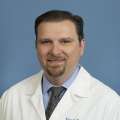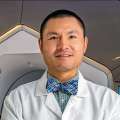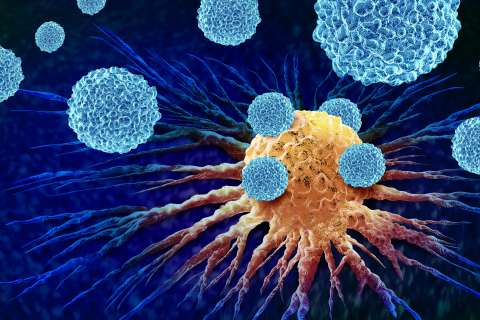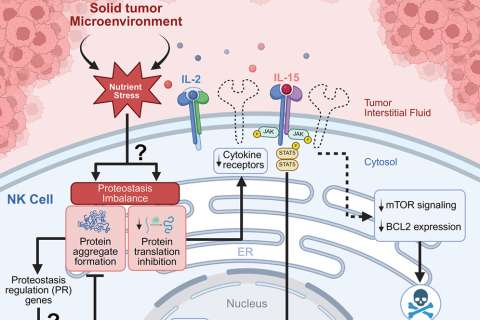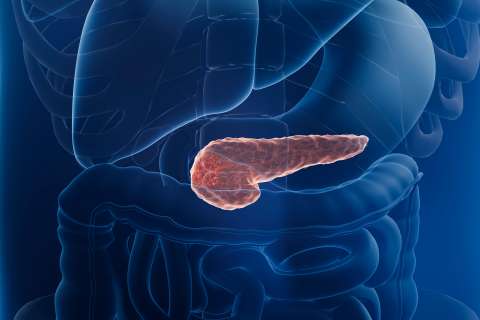Brian Coyne underwent his first colonoscopy at 38, expecting to find out that his rectal bleeding was caused by nothing more serious than hemorrhoids.
Coyne still felt groggy from sedation when his gastroenterologist said he’d encountered a rectal tumor so large that he’d had to stop the procedure.
“He said they found a tumor and he’s 99% sure that it is cancer,” said Coyne, who lives in the Sacramento area. “You never expect to get woken up with your wife sitting right next to you and that’s what they tell you.”
Coyne and his wife, Mandy, decided they would go anywhere for the best possible treatment for his stage 3 rectal cancer. Through research and a family referral, they chose UCLA Health.
“I feel I have the best medical team behind me,” said Coyne, a father of two. “How else would you describe who you feel literally saved your life?”
As March marks Colorectal Cancer Awareness Month, Coyne, now 39, reflects a concerning and baffling trend. More and more younger adults are being diagnosed with colon or rectal cancer and often at more advanced stages than older people who are eligible for routine screening.
UCLA Health colorectal surgeon Kevork Kazanjian, MD, said Coyne fits a classic scenario of a younger patient diagnosed only after a tumor has grown large enough to trigger symptoms.
“He’s too young to have a screening colonoscopy that’s going to detect a small polyp or very early cancer,” Dr. Kazanjian said. “That’s why in younger patients, where there are symptoms that could be suggestive of colorectal cancer, we have to be more vigilant and aware, and pursue it.”
Getting diagnosed
When Coyne, who lives in Cameron Park in El Dorado County, began experiencing occasional rectal bleeding in 2021, he didn’t even have a primary care doctor. Healthy and fit, Coyne rarely sought medical care.
After about six months, he made an appointment despite his usual inclination to wait for things to improve on their own.
“It finally got to the point where it was just more annoying than anything else so I went in,” he said. “I’m lucky I went in when I did. Who knows what would have happened if I’d waited a year?”
A stool test confirmed traces of blood but not the cause, so he underwent a colonoscopy in August. Coyne, who has no family history of colorectal cancer, said he appreciated that his UC Davis doctor was so candid after the procedure, even though he was stunned.
“As soon as he told me that, it was dead silent,” Coyne recalled. “My wife didn’t know what to say to me and I didn’t know what to say to her.”
As he began to process the information, Coyne broke down, wondering how much time he would have with his sons, who were 4 and 10 at the time. His wife refused to consider that scenario.
“She said basically she’s not going to do this without me so I’d better stick around,” Coyne said.
Without waiting for the biopsy results, Coyne, who owns a driving school with his dad, shared the cancer diagnosis with his parents and children.
“I told them the same day,” he said. “That’s how sure the doctor was about it.”
His oldest boy was so scared he ran away from Coyne after he told him.
“For sure, that was the toughest part,” Coyne recalled. “Kids know of cancer and they know that people die of it. We said we were going to beat it.”
His tumor measured 6 centimeters and was determined to be stage 3. The cancer had invaded the bowel wall and spread to some nearby lymph nodes but had not metastasized to other organs. Testing showed no genetic component to the cancer.
Ready to fight
After an initial consultation close to home, the couple broadened their search for cancer care. Coyne’s mother-in-law, who lives in Carpinteria, recommended UCLA Health oncologist Alexander Black, MD, who had treated her breast cancer.
As Coyne researched, he found a recorded lecture by Dr. Kazanjian, professor of surgery at the David Geffen School of Medicine at UCLA, that discussed the rising colorectal cancer rates among younger adults.
Undaunted by the six-hour drive to UCLA Health Santa Clarita Cancer Care, his first appointment was with Dr. Kazanjian.
“He sat in there and it was like he didn’t have any other patients for the rest of the day,” Coyne said.
He liked that Dr. Kazanjian made him laugh despite the reason for the visit. He also provided reassurance.
“I looked at Dr. Kazanjian and I said, ‘I need someone to look me in the eye and tell me we’re going to beat this,’ and he did,” Coyne said. “He said, ‘We’re going to do everything we can.’”
Dr. Kazanjian said he’s straightforward and direct with patients.
“I felt there was no reason why we can’t help Brian and even potentially cure him,” he said. “I try to encourage patients and give them confidence that we have the skill and experience to do this and they have the strength to do this.”
Growing numbers
The vast majority of colorectal cancer still occurs in people older than 50. But rates of colorectal cancer have been declining among older people, which is attributed to colonoscopy screening. A colonoscopy allows abnormal growths, called polyps, to be removed before they can potentially develop into cancer.
Among younger patients, rates are increasing and their cancer is often detected later. In some cases, they have trouble getting diagnosed because their symptoms are dismissed due to their age, Dr. Kazanjian said.
Symptoms may include: blood in the stool, a change in bowel habits or stool shape, diarrhea, constipation, abdominal pain or cramps and unexplained weight loss.
“The lesson from this is even though there are many benign causes of rectal bleeding, it’s always something that at least merits a follow-up with a physician,” Dr. Black said. “If it persists several weeks or longer, get evaluated.”
By 2030, colorectal cancer is forecast to become the leading cause of cancer deaths in Americans between ages 20 and 49, according to the nonprofit Colorectal Cancer Alliance.
Theories for the greater prevalence in younger adults range from unhealthy Western diets to the rise of obesity and sedentary lifestyles. Dr. Kazanjian said unknown, potentially environmental factors, likely also contribute.
“As in the case of Brian, he doesn’t fit any of those criteria for poor lifestyle habits,” Dr. Kazanjian said. “The true answer is that no one really knows at this point. We think it’s multi-factorial.”
In response, the U.S. Preventive Services Task Force in 2021 recommended lowering the colorectal cancer screening age from 50 to 45 for people of average risk.
Starting treatment
In September, about a week after meeting Dr. Kazanjian, Coyne saw Dr. Black and radiation oncologist Michael Xiang, MD, PhD. The three doctors determined that Coyne would first undergo radiation and chemotherapy to shrink the tumor before surgery to remove it. This approach has been shown to significantly reduce the risk of cancer recurrence.
“Rectal cancer is challenging because it’s in the pelvis, so there are a lot of structures nearby, like the bladder and prostate,” said Dr. Black, a clinical professor of medicine. “You want to do something that’s curative locally, but that preserves the anal sphincter so you can control your bowels.”
Coyne tolerated five days of radiation with minimal side effects.
“They do such a good job that you don’t really realize you’re that sick,” Coyne said of his visits to Santa Clarita Cancer Care. “It’s a good day when you go in there.”
In the fall, he began eight rounds of chemo, which were spaced every three weeks. His wife, sons, parents and three siblings came down for his first infusion, even though they all couldn’t go in.
Subsequently, Coyne and Mandy would fly down on Monday morning for the three-hour infusion and fly back the same day to avoid time away from the boys. At home, Coyne took an oral chemotherapy for the next two weeks before taking a week off from treatment. He continued to coach his oldest son’s soccer team.
“He had an excellent response,” Dr. Black said. “He was young and healthy.”
Mandy, a teacher, attended every chemo session – including on Valentine’s Day 2022 – except for one, when COVID-19 cases were too high to allow visitors. When the Coynes needed to spend the night, they stayed with Mandy’s parents, who also gave them rides to and from the airport.
“She said from the beginning that she wasn’t going to let me go down there by myself,” Coyne said.
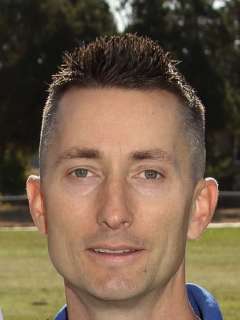
Since his diagnosis, Coyne has grown even closer to his family, saying he can never repay them for their support. He described the experience as a “divine tap on the shoulder” that has deepened his Christian faith.
“No one could have told me before I got diagnosed that I’d be a better person than before,” he said. “I know it sucks going through it, but I wouldn’t change anything.”
Between his church, extended family and medical team, he felt like he had an army surrounding him. During medical procedures where he had to stay still, he spent the time praying for his doctors, nurses and technicians.
“I felt like I had no control, but I knew everything was under control,” he said.
Coyne finished chemotherapy in March 2022. A month later, he underwent robotic surgery at Ronald Reagan UCLA Medical Center to remove the residual tumor mass and lymph nodes.
Dr. Kazanjian also performed a temporary ileostomy, in which the small intestine is diverted through a tiny opening in the abdomen where a bag collects waste. The procedure was done to allow his colon to recover from surgery.
“We removed the majority of his rectum and did a reconnection to restore his intestinal continuity, or his plumbing so to speak,” Dr. Kazanjian said. “His healing from his surgery has been perfect.”
A few days later, Dr. Kazanjian called him with the pathology report, which found no viable cancer left in the remaining mass that was removed, thanks to the excellent radiation and chemotherapy effect. It was the best possible pathology result, Dr. Kazanjian said.
“He told me this is what they hoped for and I can consider myself cancer-free,” Coyne said. “I wouldn’t have thought that when they told me it was stage 3. That’s when really all this research and the decision we made to go to UCLA and the hard work has paid off.”
A positive focus
In August, he underwent a final surgery to reverse the ileostomy and restore bowel function.
Coyne will return to Santa Clarita in April for scans to monitor him for a recurrence. He will undergo annual colonoscopies with his local gastroenterologist.
“Given the result of his surgery, he has an excellent chance of being cured,” Dr. Black said. “The more time that goes by, the risk drops off further; the less likely it is to come back. He’s been doing wonderfully.”
Dr. Kazanjian said Coyne always looked at the good things in his life, which helped him during his treatment.
“I think he had a very positive attitude,” he said. “He never gave up. He was tough and willing to do whatever it took to get through this and be there for his family.”
Coyne said he hopes to spread a message of early detection and not to ignore any unusual symptoms.
“What’s the worst that can happen? You go in there and they tell you you’re fine,” Coyne said. “The opposite is just so much worse.”
Coyne’s sons will need to begin colorectal cancer screening as young adults because of their family history. Current guidelines for people with a family history of colorectal cancer call for a colonoscopy at age 40 or 10 years before the age of diagnosis of a parent.
He said he has a fresh appreciation for every minute he spends with his sons, Austin, now 11, and Colton, 6.
“We do everything we can to make sure schedules are rearranged so we can see their practices and games,” Coyne said. “We’ve always been good about when we leave the house for work or them going to school, saying we love each other, but it means a little bit more now. There’s nothing we take for granted anymore.
“For everything that can come out negative about cancer, I’ve gotten so many more positive things.”
Courtney Perkes is the author of this article.

